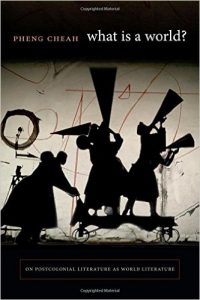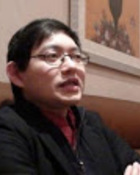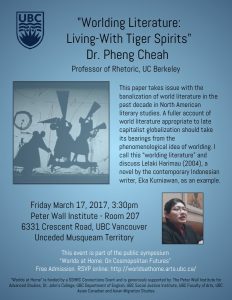Dr. Pheng Cheah (UC Berkeley)
Friday March 17th, 3:30pm, reception to follow
Peter Wall Institute for Advanced Studies, Room 207 (6331 Crescent Road)
This event is free and open to the public. Please RSVP to let us know you can make it.
 “Worlding Literature: Living-With Tiger Spirits”
“Worlding Literature: Living-With Tiger Spirits”
This paper takes issue with the banalization of world literature in the past decade in North American literary studies. By this, I mean the axiomatic equation of the world with human intercourse that stretches across global space that takes market exchange as the paradigm of human relations. The study of world literature on this basis levels off the deep normative horizon it had in earlier formulations that drew their inspiration from Goethe’s classical account. Extant normative accounts of world literature are, however, grounded in an inadequate conception of the world. Because they define the world through the anthropologistic frame of the self-actualization of universal humanity through historical progress, they presuppose a Eurocentric modern secular subject of humanity. They envision a world that cannot hospitably admit cultures that have not been completely disenchanted and purged of magic, worlds in which non-human spirits dwell with human beings. A fuller normative account of world literature appropriate to late capitalist globalization should take its bearings from the phenomenological idea of worlding. I call this “worlding literature”. I discuss Lelaki Harimau (2004), a novel by the contemporary Indonesian writer, Eka Kurniawan, recently published in English as Man Tiger (2015) by Verso, as an example.
 Pheng Cheah is a Professor of Rhetoric and the Chair of the Center for Southeast Asian Studies at University California, Berkeley. He is a leading scholar on Cosmopolitanism, World literature, and theories of globalization and transnationalism. His most recent book publications include What is a World?: On Postcolonial Literature as World Literature (2016), Derrida and the Time of the Political (2009) and Inhuman Conditions: On Cosmopolitanism and Human Rights (2007). His current book project entitled The Politics and Rights of Life: Toward a Biopolitical Theory of Human Rights is a collection of essays on the changing character of power in contemporary globalization and the role of culture and comparison in these transformations with special reference to postcolonial Asia.
Pheng Cheah is a Professor of Rhetoric and the Chair of the Center for Southeast Asian Studies at University California, Berkeley. He is a leading scholar on Cosmopolitanism, World literature, and theories of globalization and transnationalism. His most recent book publications include What is a World?: On Postcolonial Literature as World Literature (2016), Derrida and the Time of the Political (2009) and Inhuman Conditions: On Cosmopolitanism and Human Rights (2007). His current book project entitled The Politics and Rights of Life: Toward a Biopolitical Theory of Human Rights is a collection of essays on the changing character of power in contemporary globalization and the role of culture and comparison in these transformations with special reference to postcolonial Asia.
